There are some films I see because of the people who act in them (Shammi Kapoor, Asha Parekh, Mumtaz, Dharmendra, etc). Some I see because of the people who direct them (Guru Dutt, Vijay Anand, Raj Khosla). Some—relatively few—I see simply because of the music (Parasmani, Aah, Saranga—pretty awful otherwise, but great music).
And then there are some I see because they’re a bit of it all. Like Kabuliwala. The story’s by Rabindranath Tagore, it’s produced by Bimal Roy (directed by Hemen Gupta), it stars Balraj Sahni, and it has one of the loveliest patriotic songs I’ve ever heard: Ae mere pyaare watan.

I first read Kabuliwala when I was a kid; the story was in one of my school textbooks. It’s a simple, bitter-sweet, sad but yet eventually hopeful tale of the love between a little girl and a Pathan. Tagore’s work was a short story, but it’s built up deftly into a film, with believable characters (who fortunately don’t detract from the original story) and a gentle, quiet pace that retains the simplicity of the tale.
It begins in Afghanistan, where a poor Pathan, Abdur Rahman Khan (Balraj Sahni) lives with his old mother and his little daughter Ameena (Baby Farida). Khan is a widower and has had to mortgage his land and home to pay for the treatment of Ameena, who’s just recovered from a long illness. Khan realises that the only way he can earn money to pay off his debts is to travel to India and take up some trade there.
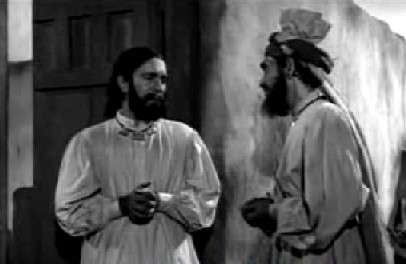
Ameena insists she will go along with her father to India, so her grandmother advises Khan to leave at night while Ameena’s asleep. Khan takes a memory of Ameena with him: an imprint of her little hands on a piece of paper.

Many days and many miles later, Khan arrives in Calcutta and begins peddling wares he’s brought from his homeland: almonds, fruit, and shawls. The local children regard him as a bogeyman of sorts, but Mini (Sonu) is more curious. Khan is reminded of Ameena, and warms to the little girl instantly. He plies her with goodies from his sack (which Mini is sure he uses to bag little children!), and Mini soon overcomes her fear of the Kabuliwala.

Mini’s father (Sajjan, in a very likeable departure from villainous roles in films like April Fool and Farz) is kindly disposed towards Khan, and sees no reason to stop Mini befriending him. Mini’s mother Rama (Usha Kiran), is however not at all pleased. Like their paranoid servant Bhola (Asit Sen), she’s scared that Khan will kidnap Mini.
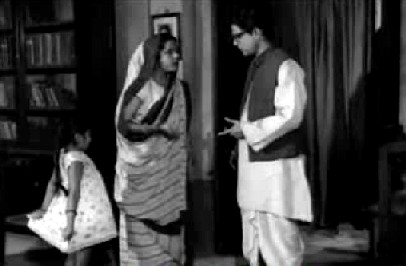
But the friendship between Khan and Mini develops quickly; he adores the little girl, and when she informs him that her birthday is round the corner, he promises to buy her bangles as a gift. Rama, protective and tetchy, insists that Khan be shooed away. Mini’s father, though embarrassed, complies and Khan (obviously hurt but acquiescent) goes off.
[Aside: Though this doesn’t add much to the story, I’m putting it in here for the sake of this screen cap: it’s adorable. At Mini’s birthday party, three little boys play music while Mini dances. Very cute!]
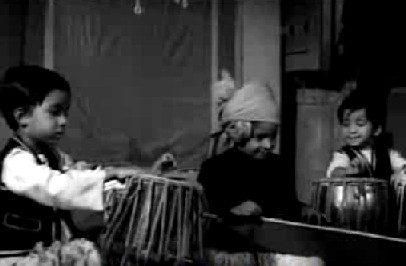
Nobody realises that Mini’s missed Khan terribly, and has kept aside a share of her birthday sweets for him. The next day, when he still doesn’t turn up, she goes off looking for him.

When Mini’s absence is noticed, the household swiftly reaches a state of near-panic. Rama is certain Khan’s kidnapped her daughter. Mini’s father goes rushing off to the neighbour’s, to the house of the doctor (Tarun Bose) and others, looking for his daughter. Khan has overheard that Mini’s gone missing, and he sets off to search for her on his own.

It’s begun pouring with rain in the meantime, and Khan takes shelter in a pavilion. When the rain finally stops, he discovers Mini lying asleep—drenched—under the staircase leading up to the pavilion. Bhola (how I want to throttle this man!) has been telling everybody that the Pathan’s abducted poor Mini, and now, when he sees Khan with Mini in his arms, he raises the alarm.

Khan is thrashed by a mob, but Mini’s father, who arrives just in time, manages to rescue him. Mini, now burning with fever, is taken home. The doctor is fetched. He gives her medicine, but is worried: she’s critically ill. Khan, who discovers the truth from Mini’s father, is distraught. Mini’s father, looking out, sees the Pathan on the pavement opposite their home, praying for Mini’s life. Khan keeps up an all-night vigil on the pavement, and next morning—when Mini is much better—comes to say hello to her from the window.
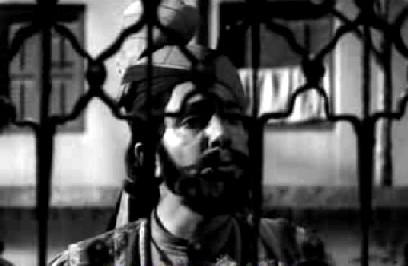
But trouble erupts all of a sudden a few days later. Khan has sold some goods on credit, including a relatively expensive shawl. When he goes to the owner’s home to demand payment, the man denies having bought anything from Khan. A quarrel breaks out. Khan loses his temper, pulls out a dagger, and stabs the man—and is immediately arrested.

This isn’t one of those films that rely on a mind-blowing plot and sudden twists in the tale. Not much actually happens, when you come to think of it. It’s a simple story, but well depicted and highly recommended. And yes, this is one of the very few films that can actually give me a lump in the throat.

What I liked about this film:
The setting. It very effectively brings to life Calcutta in a slower, quieter era when little girls wore saris, when the portrait of King George hung in courtrooms, and when people had the time to sit and chat with a child about imaginary elephants.
The characters. Sahni’s Abdur Rahman is of course very good, but the two other characters I was very impressed with were Mini and her father. Sonu is believable, not insufferably cute like a lot of other child actors tend to be. Sajjan, quiet, sensitive, yet with a sense of humour, is perfect as her father—and their interactions, with Mini sitting under his table as he plods away at the novel he’s writing—are to be treasured.
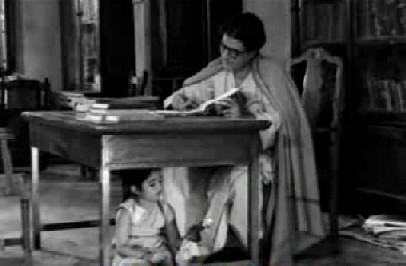
Ae mere pyaare watan. One of Manna Dey’s best ever songs, in my opinion: it gives me gooseflesh. The music, by the way, is by Salil Choudhary.
What I didn’t like:
Sahni is an excellent actor, but I think he overdid the jovial Pathan act in some scenes. He’s best where he’s restrained: the scene where he presses the sleeping Ameena’s hands to a sheet of paper is hauntingly touching.
Little bit of trivia:
Bimal Roy billed this as his `homage to Guru Dev’; the film was made for Rabindranath Tagore’s centenary, in 1961.

Balraj Sahni was an excellent actor, but yeah, he could overact some. This is a good movie but stays in memory due to the “Ae mere pyaare watan” song – A timeless classic, patriotic, loving, not jingoistic and almost “country neutral” :-) “Jis jagah paida hue, us jagah hi nikle dum” what a line.
LikeLike
This is on my shelf, waiting to be watched. I love Balraj Sahni and Bimal Roy’s films are always watchable. Still I keep hesitating because I remember how touching I found Tagore’s story (it brings on the water-works everytime!) and Manna Dey’s song is so sublimely beautiful and so touching… But then again Balraj Sahni being OTT, in a Bimal Roy movie at that, is something unusual enough (I only remember him doing it in Waqt) to watch out for!
LikeLike
Thanks also.
LikeLike
Awww this looks really great. I think I even have it :-) So many films, so little time :(
LikeLike
The Comic Project: Yes, isn’t Ae mere pyaare watan so absolutely beautiful? My niece was doing a school project on compiling patriotic film songs (I wish I’d got projects like that when I was in school!) and this was the first song I suggested. The lyrics are awesome, the music is great, and Manna Dey has sung it with so much feeling… superb.
Bollyviewer: It does turn on the waterworks – especially the last scene. I don’t cry easily, but this succeeded in making me shed a few tears. I think I like Balraj Sahni in Anuradha or even Seema better than here – he’s more subtle in those.
Memsaab: That’s my perpetual lament! I have I don’t know how many films floating about just waiting to be seen.
LikeLike
Thanks for a nice write-up on a film based on one of the best short stories ever imo. I believe, however, that this was produced by Bimal Roy but directed by Hemen Gupta who’d done several Bengali films. As you may know, Tapan Sinha (who passed away a few days back) made ‘Kabuliwalah’ in 1956 in Bengali, which was simply superb with the great Chhabi Biswas, a stalwart of Bengali theatre and a regular in Ray’s films. I haven’t seen the Hindi version but understand that this version is based on Sinha’s 1956 work. Sinha’s film received much critical acclaim and won awards at the Berlin film festival for its music and a Silver Bear (though I’m not entirely sure whether it was for best director or best actor).
LikeLike
Thanks – and also very specially for pointing out that gaffe! Yes, you’re absolutely right; Bimal Roy only produced the film, Hemen Gupta directed it.
I’ve not seen the Bengali version, but I’ve heard it praised a lot. If the Hindi version was based on the Bangla one, then I can only assume that the praise was well-deserved!
LikeLike
i luv balraj sahni!
such a great actor and understated acting.
loved him in Seema, kathputli and Garam hawa. don#t remember others
LikeLike
I haven’t seen either Kathputli or Garam Hawa :-(
But he was a very good actor – have you seen Anuradha? He was superb in that too.
LikeLike
Unfortunately I haven’t seen Anuradha. Hard to get the DVDs here.
But on my trip to india next time.
And moreover as I always tell memsaab I love to read yours and memsaabs reviews more than watching the movies. I have this old Wodehousian aunt complex.
It is painful to see that the xenophobia, which was existing in the times of Rabindranath Tagore still exists today and thrives ahead!
LikeLike
Haha – as long as I’m not equated with Aunt Agatha, I can live with that!
You’re right about the xenophobia: it’s amazing how even educated people can be so completely mindless when it comes to coming in contact with people and cultures they aren’t familiar with. Even the so-called `Madrasi’ or `North-eastern’ stereotypes are common enough: disgusting.
LikeLike
no dusted off, I didn’t mean it that way.
I mena, that I’m like that wodeshousian aunt, who gives money to her nephew, so that the can enjoy the night life on the condition, that he writes her good accounts of the high life in the city.
This episode is when Bertie Wooster with his loyal butler Jeeves is “residing” in new York. So this is an American aunt and for a change not Bertie’s aunt.
You are completely right about the stereo-types in indian society as well as hindi movies. Although I like Padosan, the depiction of the south-indian leaves behnd a bitter aftertaste.
LikeLike
Ah, okay – I think I remember the story you mean! But Bertie’s Aunt Dahlia was quite a good sort ;-)
And you’re right about Padosan: otherwise a delightful film, but that South Indian stereotyping irritated me a bit.
LikeLike
Aunt Dahlia is a cannon!
When I read Wodehouse, i forget everything around me and am totally immersed in that world. For two days I even start talking like them.
LikeLike
I’m always so happy to meet someone who likes Wodehouse: I grew up on his books (My father has a huge collection, so I read all about Jeeves and Blandings and whatnot long before I was a teenager). I still love those books, they were so amazingly wonderful: plot, language, characterisation, everything.
Which reminds me: I must look around for any films based on Wodehouse’s books. I know A Damsel in Distress and Piccadilly Jim were made into films (the latter in several versions, I believe), but I haven’t actually seen any of them…though there was a delightful Jeeves and Wooster television series starring Stephen Fry as Jeeves.
LikeLike
wow, before my teenage years I didn’t even understand wodehouse. I remember in the 10th standard book, they had a story from him and I found it damn amusing and was confused (and later aghast) to see it treated as if it was a serious literature in the guide (these awful student help books).
But this hooked me on to Wodehouse.
no, no wodehouse films for me!
i have vivid pictures of them in my mind and I don’t want anybody to come and destroy them. And I would never be able to judge them impartially!
Can you remember the DD serial on a wodehousian novel with mazhar Khan in it in the late 80s? I just didn’t find it amusing!
LikeLike
Do you mean the one that had Kiron Kher in it? And a diamond necklace that was stolen – I don’t remember it very well, but at that time at least I thought it was a fairly good adaptation of Leave it to Psmith.
BTW, if you haven’t seen Jeeves and Wooster, you must – it’s very good!
LikeLike
o did it have kiron kher? I can’t remember. I suppressed it totally.
What i missed was the wordplay. That is what makes wodehouse so amusing.
Okay I’ll see if I can get Jeeves and Wooster. How about a review? ;-)
find it great, to discuss my old passion with you.
LikeLike
Well, Jeeves and Wooster is really not quite in the ambit of a blog that stops at around 1971 and is restricted to films, not television ;-)… but yes, if I come across a good old Wodehouse film which manages to retain the hilarity of the original, I’ll definitely review it!
LikeLike
The original, Bengali version of Kabuliwalah referred to earlier by Suhan (on January 22, 2009 at 4:51 pm) is THE version to watch I believe.
I haven’t watched the Hindi version that you have reviewed here, but have seen the Bengali version by Tapan Sinha several times (and it is a part of my collection). It won the Silver Bear at Berlin for its music by Ravi Shankar when RS was pretty much unknown in the West – http://www.imdb.com/title/tt0049393/awards.
Please do check out the Bengali film – it is fairly easily available in the US and elsewhere these days.
LikeLike
Thank you! I’ll certainly look out for it, though I must admit to generally avoiding films for which I have to resort to subtitles: I find it difficult to concentrate on the film if I’m reading subtitles. Or maybe I’ll just try brushing up my Bengali…
LikeLike
I saw this yesterday and thought it was just ok, i prefer Do bigha zamin way more, it wouldn’t have hurt to show if he actually found his daughter or not upon returning to Afghanistan, i was gutted when they wrote The end as he is on his way
LikeLike
Somehow I thought the end was what clinched it… the fact that it wasn’t neatly tied up. One was left wondering what his little girl had grown up to be, whether – like Mini – she too had gotten married, and so on. Do Bigha Zameen is a superb film too; I think I’d rate both on par with each other. I can’t say which I liked more!
LikeLike
I realise I’m a bit late here,sorry (I’m reading through your blog posts in order) but yay,Wodehouse! I only started reading them recently,and still have lots to go,but they’re just so funny.And clever.The TV series is hilarious,too.
Anyway,thanks for the great blog,I really enjoy reading the reviews(more than I would watching the films,I think)
LikeLike
Thank you so much – I’m glad you like this blog!
And Wodehouse? Absolutely; that guy was so good and so delightfully witty in a lovely, innocent sort of way. The Jeeves and Wooster series is, though not an exact copy of the stories, a pretty fair representation – and I thought both the lead characters were well cast! I’m now looking to see where I can get hold of some films based on Wodehouse’s works. I know there’s an entire bunch of films, mostly pretty 40’s (such as Piccadilly Jim and A Damsel in Distress and Her Cardboard Lover) which were from his stories. Very hard to get hold of, unfortunately!
LikeLike
Dear dustedoff
I stumbled across your blog (the post Dekh Kabira Roya) while searching for reviews of the book “Bollywood Melodies: A History Of The Hindi Film Song”. What a find! Your posts are beautiful. I love the song ‘Ae mere pyare watan’ too. And I had read Tagore’s Cabuliwalah but never seen the movie. Wasn’t even sure if the movie was based on the story. Thanks for your writeup. It is just beautiful.
cheers
sriram
LikeLike
Sriram, thank you so much for stopping by and for your words of appreciation – you’ve just made my day! Really. Thank you!
By the way, do try to get hold of Kabuliwala: it’s a wonderful film. Well worth the time you’ll spend on it.
LikeLike
Hi,
Is it possible to send a copy of this video, I’d love to see it. My address is:
Sheldon Egbert
Telstra
GFlr Bldg.5, 30 Henderson Road
Clayton Vic 3168
AUSTRALIA
Tel. 61-3-85490722
LikeLike
Sheldon, sorry – I don’t have a copy, since the copy from which I did this review was a rented one. You could try http://www.induna.com – they have a wide range of (often even rare and obscure) Hindi films, and they’re very good when it comes to service. Highly recommended as a source of good Hindi films!
LikeLike
Watched this lovely film a couple of days ago.
There was nothing I didn’t like in it, including Balraj Sahni’s jovial self.
The reason is that at one point Minni mimicks his ‘heh heh heh’ laughter and says, “you are always doing ‘heh heh heh'”.
I found this sooo cute that I promptly legitimised his acting of that :-D
LikeLike
You know, I always think Minni is one of the most endearing onscreen children I’ve seen in Hindi cinema. She’s so much a child, so believable. This is such a wonderful film in so many ways.
LikeLike
A good review of a tear jerker. This story was part of my English syllabus in Class X and even then just while reading it, I would feel emotional. Though I am not a great fan of Tagore, I really liked this story. I am not sure if I will be able to watch this movie.
The TV serial that you are talking about also starred Anu Agarwal as Mazhar Khan’s love interest.
Incidentally, director Hemen Gupta passed away in 1967 and some of his movies did not find a theatrical release.
LikeLike
Tagore tends to be a bit of a hit and miss with me, too. I remember reading some of his works and thinking “So what’s so great about this?” – but there are some stories (especially some of his short stories which Ray made into films) which are mesmerising. And Kabuliwala is heartbreakingly good.
Would you know which of Hemen Gupta’s films were never released in theatres (and have they been released on DVD or VCD)?
LikeLike
Hemen Gupta’s daughter too was in movies for a brief period. She completed her education in St Xavier’s college and then did her degree from FTII. She only made three films – ” Buddha Mil Gaya”, ” Umang” and “Anokha Dan” after which she quit movies to marry Yogesh Motwani. Yes I am talking about the beautiful and immensely talented Archana Hemen Gupta.
LikeLike
My goodness. I had no idea that Archana was Hemen Gupta’s daughter! I must be one of the few people who actually remember watching Umang. Buddha Mil Gaya, of course, is very well-known. I always thought her such a refreshing change from the usual Hindi film heroine: so fresh-faced and lovely in an unpainted way, if you know what I mean.
Thank you for that bit of trivia! Made my day. :-)
LikeLike
Pingback: » The Twentyfirst Century Kabuliwalas of India TechSangam